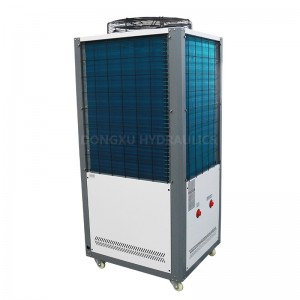Oil is an essential component in any machinery or engine, as it plays a crucial role in lubricating, cooling, and protecting various parts from wear and tear. However, excessive heat can negatively impact the oil’s viscosity characteristics and the overall performance of the machine. This is where an oil cooler comes into play. In this article, we will explore how an oil cooler works and discuss its benefits in maintaining optimal oil temperature.
An oil cooler is a device designed to control the temperature of the oil in an engine or other machinery. It operates by dissipating heat from the oil, ensuring that it remains within the desired temperature range. Two common control methods used in oil coolers are constant temperature and consistent room temperature. Users can choose the method that best suits their actual needs and requirements.
One of the most significant features of an oil cooler is its ability to monitor the oil temperature in real-time. Equipped with temperature sensors, the cooler continuously measures the oil’s temperature and makes necessary adjustments to maintain the desired level. This real-time monitoring ensures that the oil remains at an optimal temperature, preventing it from becoming too hot or too cold, both of which can have adverse effects on performance.
High oil temperature can lead to increased viscosity, thermal degradation, and oxidation of the oil, ultimately reducing its lubricating effectiveness. To counter this, oil coolers are equipped with high-temperature warning systems. These systems will trigger an alarm when the oil temperature exceeds the recommended operating range, alerting the user to potential issues. By promptly addressing high oil temperatures, the cooler helps to maintain optimal oil viscosity and prolong the life of the machine.
On the other hand, low oil temperatures can also cause problems. When the oil is too cold, it becomes thicker, increasing resistance and potentially affecting the machine’s overall efficiency. To address this, oil coolers include low-temperature alarms, which notify the user when the oil temperature drops below a certain threshold. By being alerted to low oil temperatures, users can take appropriate action, such as warming up the system before starting the machine, to ensure smooth operation.
In addition to temperature control and monitoring, oil coolers also contribute to the overall stability and performance of the machine. By keeping the oil temperature within the desired range, the cooler helps maintain the oil’s viscosity, ensuring proper lubrication of various components. This reduces friction, minimizes wear and tear, and extends the lifespan of critical parts, ultimately resulting in improved machine reliability and reduced maintenance costs.
Furthermore, an oil cooler also aids in optimizing overall energy efficiency. By regulating the oil temperature, the cooler ensures that the machine operates at its peak performance, reducing energy consumption and maximizing productivity. The ability to cool the oil efficiently and maintain its optimal temperature is particularly crucial in heavy-duty applications, where machines are subjected to high loads and extended working hours.
In conclusion, an oil cooler is an important component in maintaining optimum oil temperature and ensuring the smooth operation of any machinery or engine. The oil cooler of Dongxu Hydraulic has real-time temperature monitoring, high oil temperature warning, low oil temperature warning and other functions, which help to maintain the viscosity characteristics of the oil, prevent overheating, and improve the overall stability of the machine. Whether you choose a constant temperature or consistent room temperature control method, the use of an oil cooler is critical to maintaining the reliability and longevity of your equipment.
Post time: Sep-28-2023
